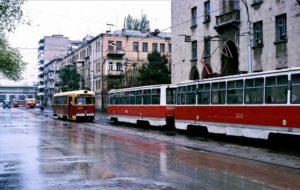By Fikret Dolukhanov (Baku)

A tram line that existed in Baku until 2004 may get re-laid soon, as hinted by representatives of Azerbaijan’s State Committee for Urban Planning and Architecture.
Baku tram lines existed from 1889 to 2004. In 1889, the horsecar line was opened in the city. On February 8, 1924, the first electric tram line in the Union of Soviet Socialist Republics (USSR), which worked until 2004, was put into operation in the Capital of the Azerbaijan Soviet Socialist Republic (SSC).
In January 2004, the Baku tram went on its last run on route No 6, after which it ceased to exist. In the same year, the last tram line in the city was completely dismantled along with the tram park.
Thus, Baku became the first in its kind twice; the first tram tracks in the USSR were built and the first Soviet tram was launched in the city, and it also became the first major city in the post-Soviet space to be left without a tram line.
Eight years later, in February 2012, the government announced plans to rebuild the tram line. The new line was supposed to be significantly shorter than the one that existed earlier, and it should not have passed along the main urban roads, as it was before. However, the project had to be abandoned eventually due to significant transformations in the city, which resulted in the town-planning concept getting revamped.
Nevertheless, the latest statements of relevant and interested parties suggest that trams may soon reappear on the streets of the city.
According to Samir Nuriyev, the Chairman of the State Committee for Architecture and Urban Development, discussions to restore the work of trams are planned with the relevant government agencies within the framework of developing a master plan for the capital, and a decision will be made after the comprehensive study of the situation in Baku and of the world practice on this issue.
The restoration of the Baku tram system is thus closely related to the development of the master plan for the Capital of Azerbaijan.
More recently, it was announced that the second phase of the development of the city’s master plan is currently being implemented.
As per the Deputy Chairman of the State Committee for Architecture and Urban Development Dovlatkhan Dovlatkhanov, the first stage of the development, involving the creation of a development concept, has already been completed and work has begun on the second stage, during which an international urban organization with extensive experience in this field will be selected.
The second stage will most likely involve discussions on restoration of the tram system in the city and drawing of final decision, which means that it is going to happen quite soon.
On the other hand, foreign partners have been ready to implement this project for several years already and are waiting for the decision of the Azerbaijani side.
In particular, in an interview with journalists, Alstom (France) Managing Director for Western and Central Asia Cluster, Bernard Peille, reminded that the company proposed a preliminary project to restore tram lines in Baku several years ago, but plans changed due to the holding of Formula One competitions in the capital.
Peille, obviously, was talking about the plans announced by the Azerbaijani side in 2012, which ultimately had to be abandoned.
“Of course, it’d be nice for the city to have this type of transportation. It’s very accessible for the people in areas where there are lots of tourists. For us, the restoration of the tram line is something that we are already seeing today. We can see it in Astana and Almaty, for example. The latter also has a project to launch with public-private partnership in 2019 for restoration of light rail,” Peille said in the interview.
He added that the new trams allow you to travel seeing the whole city. They are very ecofriendly and have no emissions. Trams have been adopted in almost all cities in Europe with population above 200,000 people, and are working very efficiently.
All these advantages are particularly relevant keeping in mind that Baku becomes larger and larger from year to year and attracts an increasing number of tourists. The city regularly hosts authoritative international events, and the emergence of such a convenient and environmentally friendly type of transportation would undoubtedly make a significant contribution to the development of urban infrastructure and further strengthen the image of the capital.





